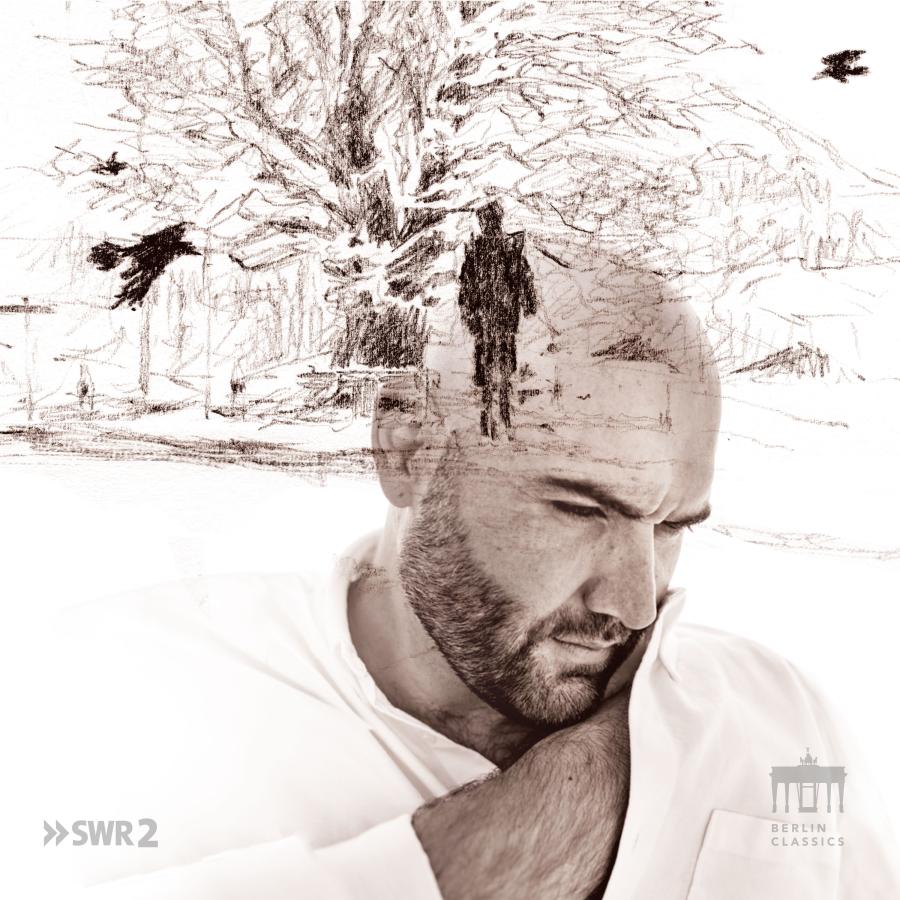Xavier Sabata has long since established himself as an exponent of the great roles for countertenor and he is a welcome guest on the stages of opera houses worldwide. His discography to date illustrates his voice-motivated focus on music from 1600 to 1800 while also presenting the portrait of an artist who engages with intellectual concepts across the world and throughout the ages. His debut album on Berlin Classics marks his departure from Baroque terrain and makes him a wanderer, in more senses than one, facing the emotional and vocal challenges of Schubert’s “Winter Journey”.
In an age in which Mussorgsky’s Pictures at an Exhibition are played on the accordion, Vivaldi’s Four Seasons taken apart and rearranged, and a chamber septet can perform the Goldberg Variations of Johann Sebastian Bach himself, the old idea of fidelity to the Urtext loses its significance. It seems that these days, nothing is sacred: not even the greatest work of the Lieder repertoire, Franz Schubert’s Winterreise. Catalan countertenor Xavier Sabata sings the work, written one year before the composer’s death, with the support of pianist Francisco Poyato and in doing so is one of the first of his fach to have tackled the cycle. He himself sees no reason why his voice register should be an issue. “Schubert had friends who were not professional singers and still sang his Lieder. I am so grateful that women have taken it upon themselves to sing this work. Why should a counter-tenor not sing it too, if he succeeds in bringing out the deep inner conflicts, feelings and meanings of the piece?”
“I am no lover of assignment to particular registers,” says Xavier Sabata. “Many people are happier when they can pigeonhole a thing. That may even provide a degree of reassurance. But music and art must never have labels stuck to them! Every time something is performed, a new work of art is created.” Franz Schubert’s Winterreise, which has been interpreted by all the leading male and female singers, is widely regarded as the peak of Lieder singing. Every song in the two-part cycle of 24 settings of poems by Wilhelm Müller throws a brilliant light on successive scenes, moments and thoughts in the journey of the Wanderer.
His approach to the work is prompted by the same challenge that confronts every singer who tackles Winterreise. “When I sing the Winter Journey I wish to understand this being that seeks to communicate itself. I am not out to deliver perfect vocal technique. Nor do I judge the characters that I portray. I do not pity them either. I do not think of the Wanderer as impoverished. The Wanderer is essentially a student of life. Of course he must come to terms with a particular environment, but he is not concerned about how he does it. He has real courage, too, because it takes a lot to stand up for yourself in such a situation. I appreciate him just as he is.”
Schubert: Winterreise Xavier Sabata & Francisco Poyato

Composer

Further information
Genre
Lied (Kunstlied)
Kunstlied Countertenor
Publication date
01.11.2019
Xavier Sabata has long since established himself as an exponent of the great roles for countertenor and he is a welcome guest on the stages of opera houses worldwide. His discography to date illustrates his voice-motivated focus on music from 1600 to 1800 while also presenting the portrait of an artist who engages with intellectual concepts across the world and throughout the ages. His debut album on Berlin Classics marks his departure from Baroque terrain and makes him a wanderer, in more senses than one, facing the emotional and vocal challenges of Schubert’s “Winter Journey”.
In an age in which Mussorgsky’s Pictures at an Exhibition are played on the accordion, Vivaldi’s Four Seasons taken apart and rearranged, and a chamber septet can perform the Goldberg Variations of Johann Sebastian Bach himself, the old idea of fidelity to the Urtext loses its significance. It seems that these days, nothing is sacred: not even the greatest work of the Lieder repertoire, Franz Schubert’s Winterreise. Catalan countertenor Xavier Sabata sings the work, written one year before the composer’s death, with the support of pianist Francisco Poyato and in doing so is one of the first of his fach to have tackled the cycle. He himself sees no reason why his voice register should be an issue. “Schubert had friends who were not professional singers and still sang his Lieder. I am so grateful that women have taken it upon themselves to sing this work. Why should a counter-tenor not sing it too, if he succeeds in bringing out the deep inner conflicts, feelings and meanings of the piece?”
“I am no lover of assignment to particular registers,” says Xavier Sabata. “Many people are happier when they can pigeonhole a thing. That may even provide a degree of reassurance. But music and art must never have labels stuck to them! Every time something is performed, a new work of art is created.” Franz Schubert’s Winterreise, which has been interpreted by all the leading male and female singers, is widely regarded as the peak of Lieder singing. Every song in the two-part cycle of 24 settings of poems by Wilhelm Müller throws a brilliant light on successive scenes, moments and thoughts in the journey of the Wanderer.
His approach to the work is prompted by the same challenge that confronts every singer who tackles Winterreise. “When I sing the Winter Journey I wish to understand this being that seeks to communicate itself. I am not out to deliver perfect vocal technique. Nor do I judge the characters that I portray. I do not pity them either. I do not think of the Wanderer as impoverished. The Wanderer is essentially a student of life. Of course he must come to terms with a particular environment, but he is not concerned about how he does it. He has real courage, too, because it takes a lot to stand up for yourself in such a situation. I appreciate him just as he is.”
Tracklist - These are the tracks you will hear on the album
Schubert: Winterreise
Xavier Sabata & Francisco Poyato
1
No. 1, Gute Nacht
2
No. 2, Die Wetterfahne
3
No. 3, Gefror'ne Tränen
4
No. 4, Erstarrung
5
No. 5, Der Lindenbaum
6
No. 6, Wasserflut
7
No. 7, Auf dem Flusse
8
No. 8, Rückblick
9
No. 9, Irrlicht
10
No. 10, Rast
11
No. 11, Frühlingstraum
12
No. 12, Einsamkeit
13
No. 13, Die Post
14
No. 14, Der greise Kopf
15
No. 15, Die Krähe
16
No. 16, Letzte Hoffnung
17
No. 17, Im Dorfe
18
No. 18, Der stürmische Morgen
19
No. 19, Täuschung
20
No. 20, Der Wegweiser
21
No. 21, Das Wirtshaus
22
No. 22, Mut
23
No. 23, Die Nebensonnen
24
No. 24, Der Leiermann
















